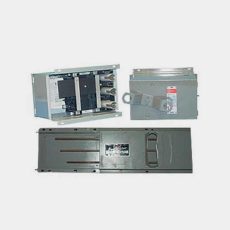BUSWAYS
Say goodbye to cable and conduit.
Say hello to busway.
Busway is extremely beneficial in electrical systems that require a lot of flexibility, but that is not the only advantage when compared to cable bus. Bus duct typically takes up less space and when used across a multi-floor, multi-tenant building, bus duct only requires a single circuit for all floors. It is also much simpler to reconfigure busway if you need to expand, alter or move parts of your busway system.

Bus Plugs
Bus plugs are what connect busway and bus duct and deliver electricity to the appropriate equipment. They are essentially giant electrical plugs that connect to a piece of bus duct, and are responsible for powering whatever circuits or equipment that piece of busway is connected to. They are preferred in situations where the loads change frequently and get moved around. Both fusible and non-fusible bus plugs are available.
Bus Duct
Bus duct is composed of large sheets of either copper or aluminum in order to conduct high electrical currents. Bus plugs, bus duct switches and bus duct disconnects are used facilitate the distribution of power throughout runs of busway as well as the entire electrical system. Types of bus ducts include non-segregated bus duct, segregated phase bus duct, isolated phase bus duct, cast resin bus duct, air insulated bus duct, low voltage or LV bus duct, medium voltage bus duct, sandwich bus duct and more.
Bus Box, Tap & Terminal Boxes
Bus boxes, terminal boxes and busway tap boxes are installed either at the beginning or the end of a busway run. They are non-fusible and can be used on both vertical and horizontal bus as either bolt-on or plug in busway tap boxes. They are used to connect cable to the beginning or end of a busway run.
